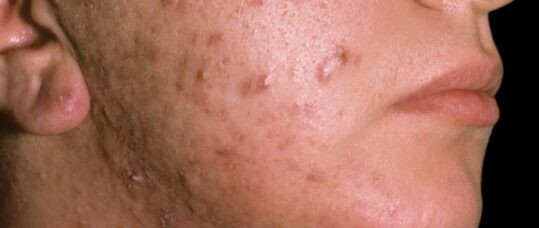Mythbuster: ‘Chocolate can cause acne, and altering the diet can improve it’

Sandra Lawton on the evidence for diet alterations in the treatment of acne
The myth
There is still a belief that eating too much chocolate causes spots and that altering the diet will prevent or improve acne.
The reality
There is limited evidence to back up such a claim. There have been small, poor-quality studies that have not been well designed, blinded, or randomised, or have not used a provocation trial.1 There is currently no strong research-based evidence that connects diet with acne. However, observational and anecdotal evidence does suggest that there may be a link between foods that significantly increase blood sugar levels (such as carbohydrates, sugars and dairy) and the development of acne.2
Other authors have also reviewed dietary interventions for acne and concluded that further research is needed to fully elucidate the role diet plays in acne, including associations with insulin and low glycaemic index diets and protective effects of antioxidant-rich, anti-inflammatory and probiotic diets in specific populations.3 More recently, the Priority Setting Partnership for Acne identified the following question as one of its top 10 uncertainties:4 which lifestyle factors affect acne susceptibility or acne severity the most, and could diet be one of them?
|
Top 10 uncertainties in acne Related Article: Weight loss medication is no magic wand 1 What management strategy should be adopted for the treatment of acne to optimise short- and long-term outcomes? 2 What is the correct way to use antibiotics in acne to achieve the best outcomes with least risk? 3 What is the best treatment for acne scars? 4 What is the best way of preventing acne? 5 What is the correct way to use oral isotretinoin in acne to achieve the best outcomes with least risk of potentially serious adverse effects? 6 Which lifestyle factors affect acne susceptibility or acne severity the most and could diet be one of them? 7 What is the best way of managing acne in mature women who may or may not have underlying hormonal abnormalities? 8 What is the best topical product for treating acne? 9 Which physical therapies, including lasers and other light-based treatments, are safe and effective in treating outbreaks of acne? 10 How long do acne treatments take to work and which ones are fastest acting? |
At this stage we do not know all the answers, and the evidence about dietary factors in acne requires closer examination in cohort and experimental studies.1 Other lifestyle factors asked about include stress – and again there is limited research, although observational and anecdotal evidence does suggest that there may be a link between stress and the onset of acne. Stress also causes inflammation, which can worsen the appearance of pre-existing acne. For many young people with acne, their appearance and how people treat them can have an impact on their feelings and additional support and help is available from skinsupport.org.uk/emotional-support.html.
Other common misconceptions about acne include comments that it’s linked with poor hygiene or the presence of dirt on the skin. This is not true but cosmetic products (make-up, hair wax, oily moisturisers) used on the skin may potentially irritate, block hair follicles and may exacerbate the acne. Exfoliation may help in this case. There is limited evidence on the role of cleansers for acne.5
Related Article: Prescribing in England to be led by a single national formulary
Sandra Lawton is a nurse consultant in dermatology at Rotherham NHS Foundation Trust, South Yorkshire
References
1 Bhate K, Williams H. Epidemiology of acne vulgaris. British Journal of Dermatology 2013 168:474-85
2 Acne Support Causes (2018) acnesupport.org.uk
3 Steventon K, Cowdell F. Acne and diet: a review of the latest evidence. Dermatological Nursing 2013;12:28-34
4 Layton A, Eady E, Peat M et al. Identifying acne treatment uncertainties via a James Lind Alliance Priority Setting Partnership. BMJ Open 2015;5:e008085. doi:10.1136/bmjopen-2015- 008085
Related Article: Advice on Guillain-Barré risk for adult RSV vaccine updated by MHRA
5 Stringer T, Nagler A, Orlow S et al. Clinical evidence for washing and cleansers in acne vulgaris: a systematic review. Journal of Dermatological Treatment 2018 DOI:10.1080/ 09546634.2018.1442552
Further Information:
James Lind Alliance Priority Setting Partnership jla.nihr.ac.uk/priority-setting-partnerships/acne/top-10-priorities/
Systematic reviews on acne vulgarisnottingham.ac.uk/research/groups/cebd/resources/acne-systematic-reviews.aspx

See how our symptom tool can help you make better sense of patient presentations
Click here to search a symptom


Sandra Lawton on the evidence for diet alterations in the treatment of acne



